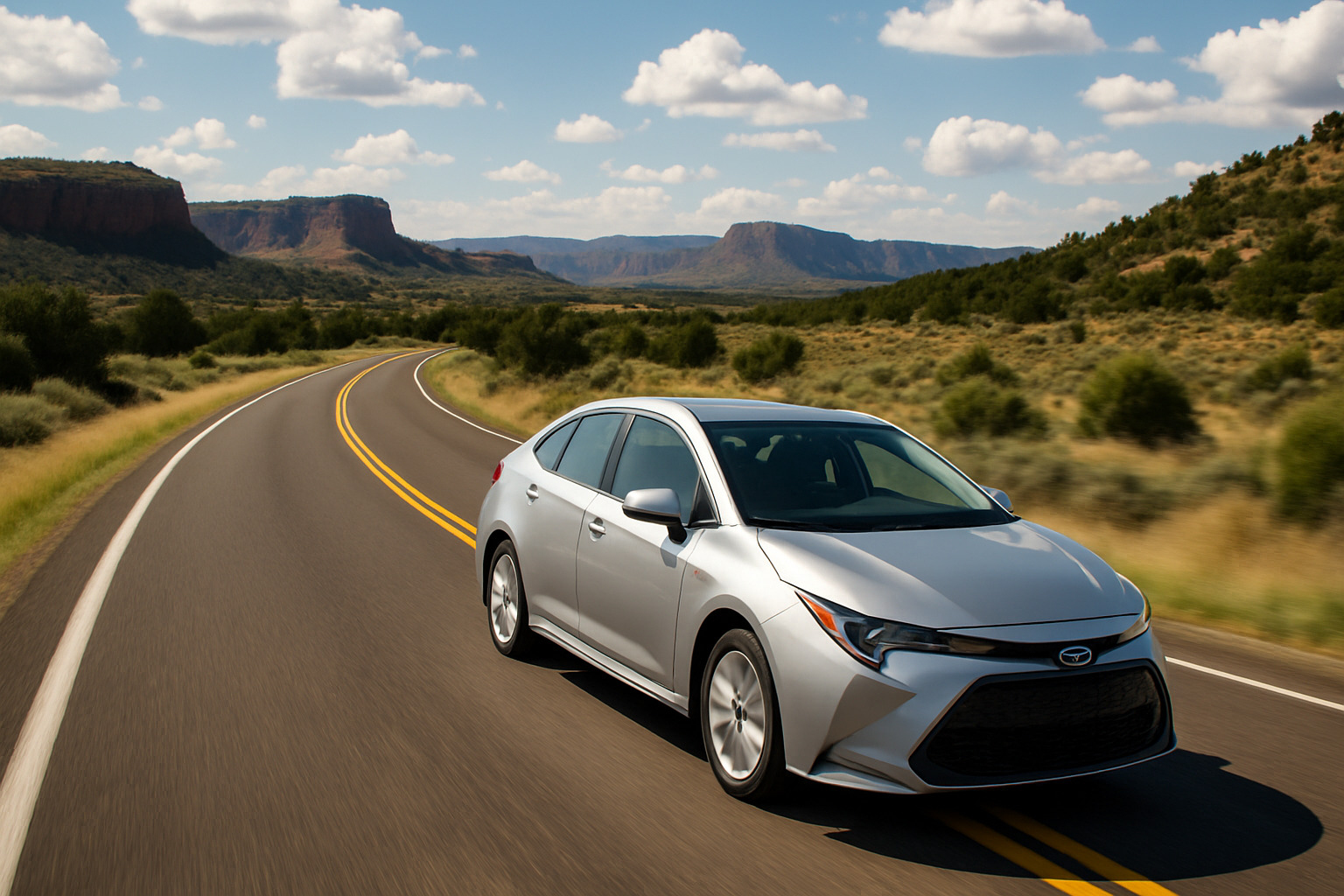Best highway gas mileage car: Maximize MPG in 2025
Why Highway MPG Matters More Than Ever
Finding the best highway gas mileage car is more important than ever as fuel costs continue to rise and road trips become our preferred escape from daily life. With gas prices fluctuating and environmental concerns growing, smart drivers are looking for vehicles that can deliver exceptional fuel economy on the open road.
Top Highway Gas Mileage Cars for 2025:
- 2025 Kia Niro – 54 mpg highway
- 2025 Toyota Prius – 56-57 mpg highway
- 2025 Hyundai Elantra Hybrid – 54 mpg highway
- 2025 Honda Civic – 41 mpg highway
- 2025 Kia Sportage Hybrid – 44 mpg highway
Highway fuel economy differs significantly from city driving. While city MPG focuses on stop-and-go efficiency, highway MPG measures how well your car sips fuel at steady speeds – typically between 55-70 mph. This makes highway ratings especially relevant for road trips, daily commutes, and long-distance travel.
According to the EPA, the average 2024 vehicle gets just 28 mpg combined. The cars on our list beat that by huge margins, with some achieving over 50 mpg on the highway. Whether you’re planning cross-country trips or simply want to save money on your daily commute, choosing a fuel-efficient vehicle can save you thousands of dollars over five years.
The landscape of efficient vehicles has changed dramatically. Modern hybrids like the Toyota Prius now deliver 57 mpg combined while offering engaging driving dynamics. Even non-hybrid options like the Honda Civic can achieve 41 mpg highway – proving you don’t need to sacrifice performance for efficiency.
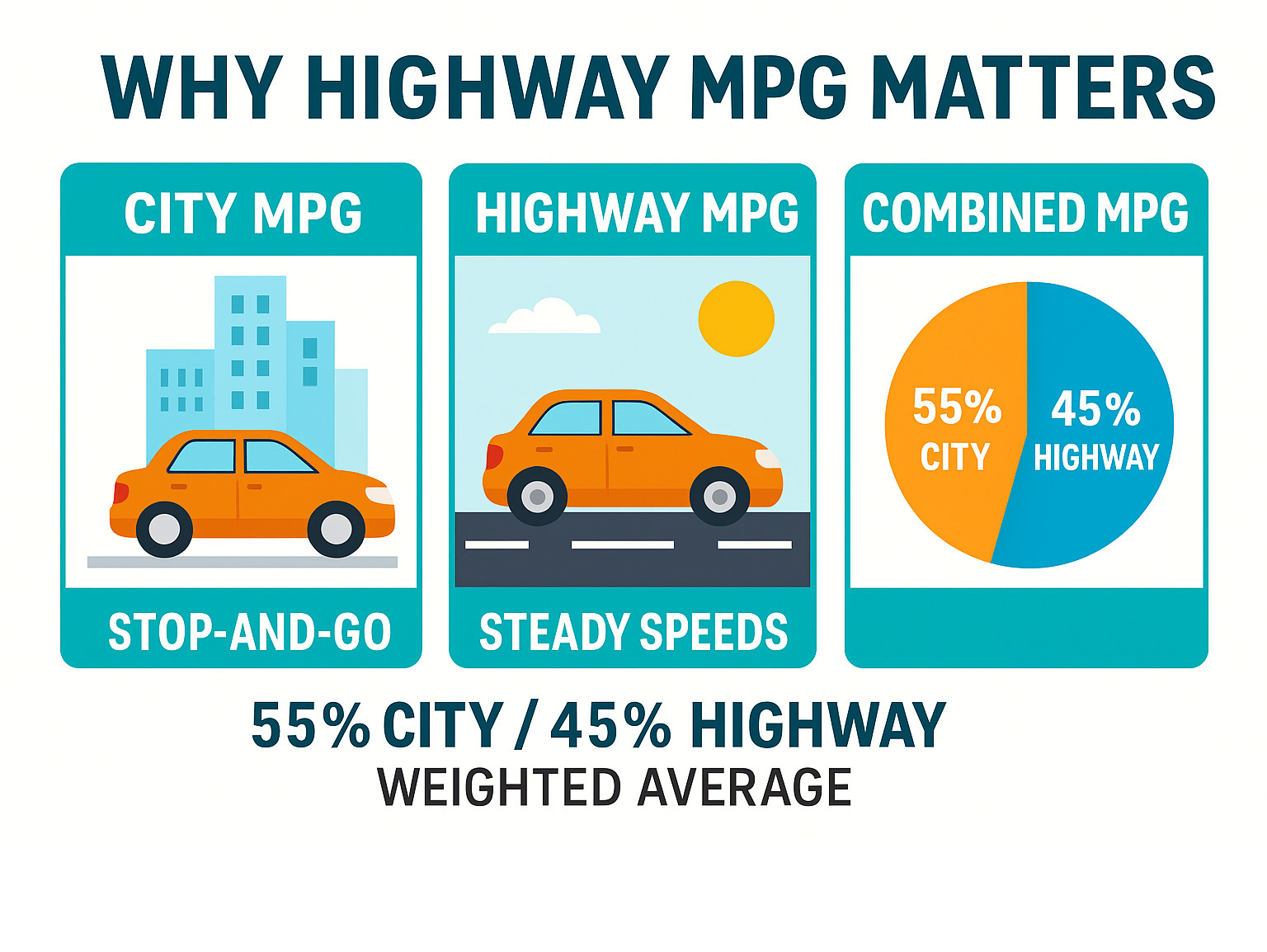
Best highway gas mileage car terms to remember:
- best car for long highway commute
- best hybrid car for highway driving
- best hybrid suv for highway driving
The Science of Sipping Fuel on the Freeway
Ever wonder why your car suddenly becomes a fuel-sipping champion on the highway? The science behind finding the best highway gas mileage car comes down to several fascinating factors that work together at steady speeds.
Aerodynamics becomes your best friend once you hit the freeway. Think of it this way – your car is constantly pushing through a wall of air, and the sleeker the shape, the less energy it takes. The drag coefficient measures how smoothly air flows around your vehicle. Cars with that distinctive teardrop shape (like the Toyota Prius with its wedge-like profile) slice through air much more efficiently than boxy SUVs. This is exactly why sedans and hatchbacks typically dominate highway MPG ratings.
Vehicle weight plays a huge role, especially when you’re accelerating to merge or climb hills. Modern automakers have gotten incredibly clever with lightweight materials like aluminum and high-strength steel. These materials help cars shed pounds without compromising safety. Take the 2024 Mitsubishi Mirage – at barely over 2,100 pounds, it achieves an impressive 43 mpg highway despite having just a basic 78-horsepower engine.
Engine technology has come a long way from the gas-guzzling engines of the past. Today’s turbocharged engines, direct fuel injection, and variable valve timing allow smaller engines to punch above their weight class. The 2025 Honda Civic’s 1.5-liter turbocharged engine is a perfect example – it delivers 180 horsepower while still achieving 41 mpg highway. That would have been pure fantasy just ten years ago.
Your transmission type matters more than you might think. Continuously Variable Transmissions (CVTs) excel at keeping your engine in its sweet spot for fuel economy. Traditional automatics with high gear ratios allow engines to cruise at lower RPMs on the highway, sipping fuel instead of gulping it. The Ford and GM co-developed 9T50 nine-speed automatic helped the 2017 Chevrolet Cruze diesel achieve an astounding 70 mpg in hypermiling tests.
Don’t overlook the basics – tire pressure and low rolling resistance tires can make or break your fuel economy. Properly inflated tires reduce the energy needed to roll down the road, while specialized low rolling resistance tires can boost your MPG by 1-2 points. Underinflated tires are one of the sneakiest fuel economy killers, making regular pressure checks essential for any best highway gas mileage car.
The 2025 Champions: Finding the Best Highway Gas Mileage Car
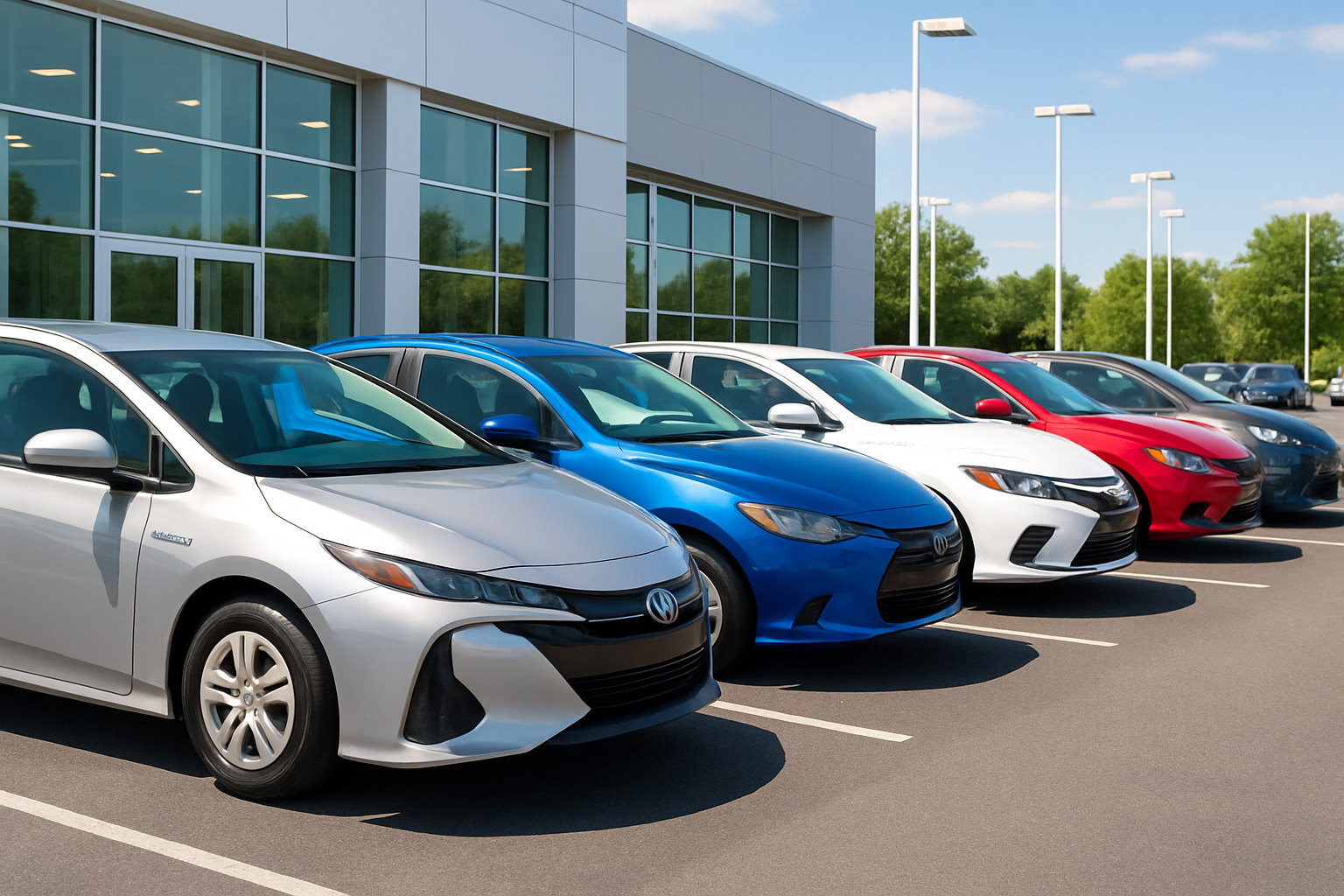
The 2025 model year marks a turning point for fuel efficiency. Automakers are delivering the best highway gas mileage car options across every category, from sporty sedans to family-friendly SUVs. Whether you’re drawn to cutting-edge hybrid technology or prefer traditional gas engines, there’s never been a better time to find a vehicle that sips fuel on the freeway.
What’s exciting is how these efficient cars no longer require sacrificing the driving experience. Modern engineering has created vehicles that deliver exceptional highway MPG while still being genuinely fun to drive.
Top Sedans and Compacts for the Open Road
Sedans and compact cars continue to dominate the efficiency game, and for good reason. Their sleek profiles slice through the air with minimal resistance, while their lighter weight means less energy needed to maintain highway speeds.
The 2025 Toyota Prius stands as the undisputed champion, delivering an impressive 56-57 mpg highway depending on trim. Toyota completely redesigned this efficiency icon, changing it from plain to genuinely stylish. The new Prius packs up to 196 horsepower while maintaining legendary fuel economy—proof that the best highway gas mileage car doesn’t have to be boring.
The 2025 Hyundai Elantra offers something for everyone with both gas-only and hybrid versions. The hybrid variant achieves 54 mpg highway, while even the base gas model delivers a solid 41 mpg highway. Starting around $23,000, the Elantra provides outstanding value with extensive standard safety features and modern technology.
Honda’s 2025 Civic impresses with its 41 mpg highway rating from a peppy 1.5-liter turbocharged engine. The Civic combines excellent fuel economy, engaging driving dynamics, and a surprisingly spacious interior all in one package.
For budget-conscious drivers, the 2024 Mitsubishi Mirage achieves 43 mpg highway while holding the distinction of being America’s most fuel-efficient and least-expensive gas-powered car. Its 1.2-liter three-cylinder engine produces just 78 horsepower, but the car’s featherweight construction (barely over 2,100 pounds) helps it reach impressive efficiency numbers.
These sedans and compacts prove that practical doesn’t mean dull. More info about the Best Car for Long Highway Commute.
The Best Highway Gas Mileage Car: SUVs and Crossovers

The SUV segment has experienced a fuel-economy revolution. Modern crossovers built on car-like platforms now deliver highway efficiency that would have been unthinkable just a few years ago, all while providing the space and versatility that families crave.
Leading this efficiency charge is the 2025 Kia Niro, which achieves an outstanding 54 mpg highway with its hybrid powertrain. This crossover offers 63.7 cubic feet of maximum cargo space while delivering exceptional fuel economy. The Niro even holds a Guinness World Record for lowest fuel consumption by a hybrid vehicle, achieving 76.6 mpg on a cross-country drive.
The 2025 Kia Sportage Hybrid delivers 44 mpg highway while offering a compelling blend of efficiency and utility. Its 73.7 cubic feet of maximum cargo space makes it genuinely practical for families, while the hybrid powertrain provides smooth, confident acceleration that makes highway driving a pleasure.
Toyota’s 2025 RAV4 Hybrid achieves 38 mpg highway while providing nearly 70 cubic feet of cargo space and standard all-wheel drive. While not the most efficient SUV on our list, it offers a proven combination of reliability, capability, and fuel economy that has made it a consistent bestseller among families who need both efficiency and confidence in various driving conditions.
The 2025 Honda CR-V Hybrid rounds out our top picks with 36 mpg highway (front-wheel drive) while delivering 204 horsepower and 76.5 cubic feet of maximum cargo space. Its refined driving dynamics and spacious interior make it an excellent choice for families who prioritize both efficiency and comfort on long highway trips.
These SUVs demonstrate that you no longer have to choose between space and efficiency. More info about Fuel-Efficient SUVs.
The Hybrid vs. Gas-Only Debate for Highway Driving
The old belief that hybrids only shine in city driving is completely outdated. Modern hybrid systems work remarkably well at highway speeds, often delivering better fuel economy than their gas-only counterparts while providing smoother, more refined driving experiences.
Today’s hybrid powertrains combine gasoline engines with electric motors and batteries in sophisticated ways. While regenerative braking provides the most benefit in stop-and-go traffic, the electric motor assists the gas engine during acceleration and cruising, reducing overall fuel consumption. The gas engine can even shut off during light load conditions, allowing the electric motor to propel the vehicle silently down the highway.
The 2025 Toyota Camry Hybrid exemplifies this new generation of highway-capable hybrids. With 51 mpg combined, the Camry Hybrid demonstrates that efficiency doesn’t require compromise. Its hybrid system produces confident acceleration while delivering exceptional fuel economy that makes every highway mile more affordable.
Similarly, the 2025 Honda Accord Hybrid achieves 48 mpg combined while maintaining the spacious interior and refined driving dynamics that have made it a favorite among automotive enthusiasts for years. The hybrid powertrain adds efficiency without sacrificing the engaging driving experience that makes long highway trips enjoyable.
Gas-only vehicles haven’t been standing still either. The 2025 Honda Civic achieves 41 mpg highway with its turbocharged gas engine, while the 2025 Hyundai Elantra delivers similar efficiency. These gas-only options often cost less upfront than their hybrid counterparts while still providing excellent fuel economy for drivers who prefer traditional powertrains.
The choice between hybrid and gas-only ultimately depends on your driving patterns and budget. For consistent highway driving, both can deliver excellent results and help you find the best highway gas mileage car for your specific needs. More info about What Hybrid Car Gets the Best Highway Mileage?.
High-MPG Heroes: Luxury, Performance, and Pre-Owned Picks

Efficiency doesn’t mean sacrificing luxury or performance. Several premium vehicles deliver impressive highway fuel economy while providing the refinement and features that discerning drivers expect.
Can Luxury and Performance Cars Have Great Highway MPG?
The luxury segment has acceptd efficiency without compromising on comfort or performance. These vehicles prove that you can have your cake and eat it too.
2025 Lexus UX Hybrid – Delivering 41 mpg highway, the UX Hybrid represents the “epitome of luxury and efficiency.” With 196 horsepower and a premium interior, it offers luxury appointments while achieving excellent fuel economy. The compact luxury SUV provides 17.1 cubic feet of cargo space behind the rear seats.
2025 Acura Integra – This sporty sedan achieves 37 mpg highway while delivering 200 horsepower and engaging driving dynamics. The Integra proves that performance and efficiency can coexist, offering a more engaging driving experience than many economy-focused vehicles.
2025 Volvo S60 – Available with both mild hybrid and plug-in hybrid powertrains, the S60 combines Scandinavian luxury with impressive efficiency. The plug-in hybrid version achieves 74 MPGe combined with 41 miles of electric-only range, while the mild hybrid delivers excellent gas-only fuel economy.
These luxury vehicles demonstrate that efficiency is no longer the exclusive domain of economy cars. More info about Eco-Friendly Luxury Cars.
Top Used Cars for the Best Highway Gas Mileage
For budget-conscious buyers, the used car market offers excellent opportunities to find fuel-efficient vehicles at attractive prices. Many older hybrids and efficient gas cars provide outstanding highway fuel economy.
2010 Toyota Prius – The second-generation Prius delivers 48 mpg highway and has proven long-term reliability. With many examples available under $15,000, it represents excellent value for buyers seeking maximum efficiency on a budget.
2017 Hyundai Ioniq Hybrid – Achieving an impressive 59 mpg highway, the Ioniq Hybrid was one of the most efficient vehicles ever produced. Its aerodynamic design and advanced hybrid system deliver exceptional fuel economy, making it an excellent used car choice.
2013 Honda Civic Hybrid – With 45 mpg highway, the Civic Hybrid offers the reliability and practicality of the regular Civic with significantly better fuel economy. Honda’s hybrid system proved durable and efficient in this generation.
These used vehicles offer proven efficiency at attractive prices, making them ideal for buyers who want maximum fuel economy without the cost of a new car.
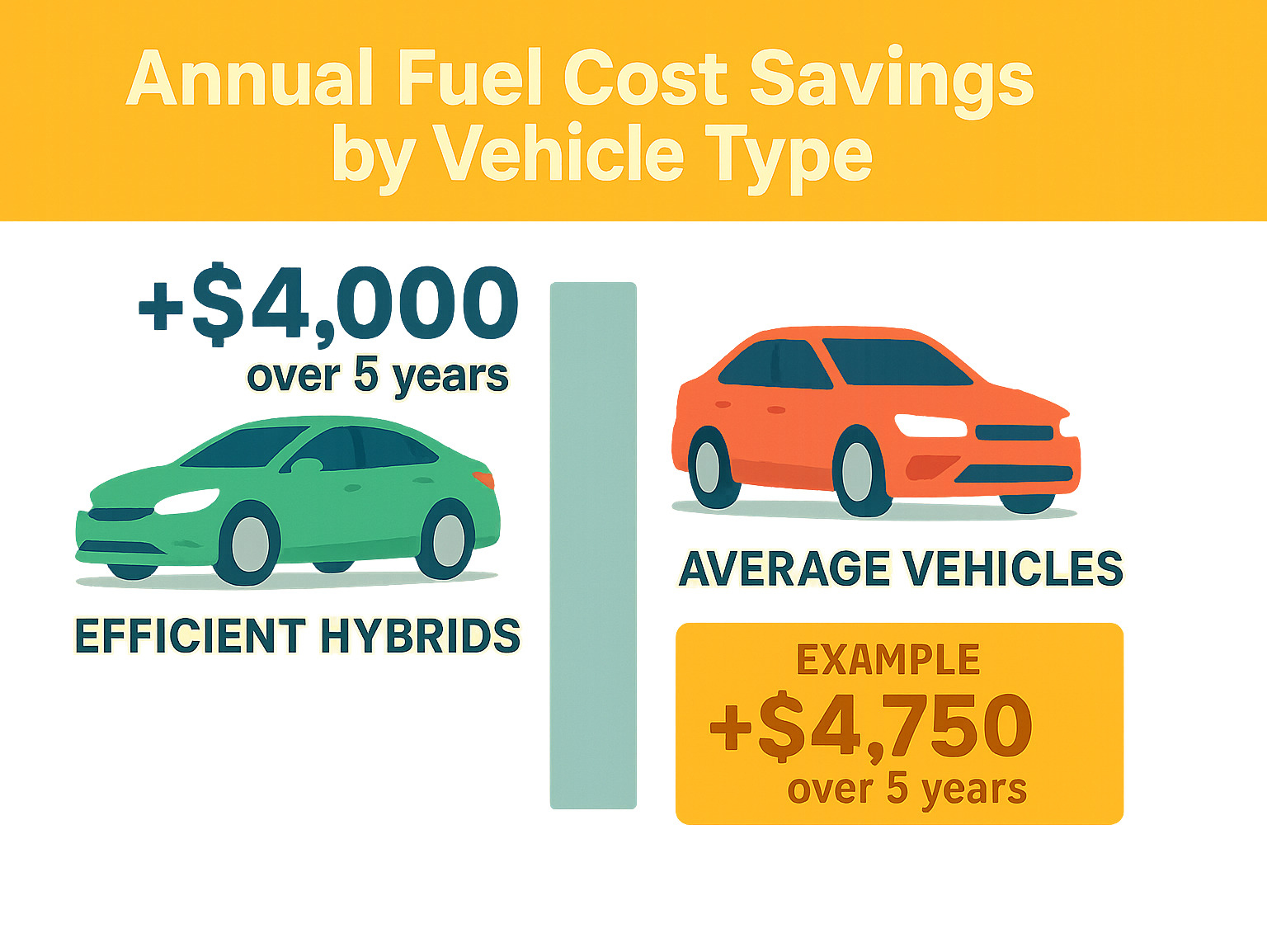
Pro Tips and FAQs for Maximizing Your Fuel Economy
Getting the best highway gas mileage car is just the first step. Even the most efficient vehicle won’t deliver its full potential without smart driving habits and proper maintenance. The good news? Small changes can boost your fuel economy by 10-15% without spending a dime.
Driving Habits to Boost Your Highway MPG
Your right foot is your most powerful fuel-saving tool. Think of it as a dimmer switch rather than an on-off button.
Smooth acceleration and braking make the biggest difference. Imagine you have a full cup of coffee on your dashboard – drive smoothly enough that it won’t spill. This gentle approach allows your engine to operate in its sweet spot and maximizes regenerative braking benefits in hybrids.
Cruise control is your friend on flat highways. It maintains steady speeds better than your foot can, eliminating the tiny speed variations that waste fuel. However, turn it off in hilly terrain where your brain can anticipate hills better than the computer can.
Finding your car’s optimal speed can dramatically improve efficiency. Most vehicles hit their fuel economy peak between 45-55 mph. Above 70 mph, aerodynamic drag becomes a fuel-hungry monster. Slowing down by just 5-10 mph can improve your highway fuel economy by 7-14%.
Anticipating traffic flow turns driving into a fuel-saving game. Look far ahead and coast to red lights rather than racing up to them. Gradual speed adjustments keep your engine happy and your wallet happier.
Air conditioning presents a classic highway dilemma. At low speeds, open windows beat AC for efficiency. But above 50 mph, the aerodynamic drag from open windows actually hurts fuel economy more than running the air conditioner. When you do use AC, set it a few degrees warmer than usual to reduce the load on your engine.
Essential Maintenance for Peak Efficiency
A well-maintained car is an efficient car. Neglecting basic maintenance can slash your fuel economy by 10-40% – that’s like throwing money out the window.
Proper tire inflation might be the most overlooked fuel-saver. Check your tire pressure monthly using the numbers on the door jamb sticker, not the tire sidewall. Underinflated tires create rolling resistance that forces your engine to work harder. It’s like riding a bicycle with flat tires – possible, but exhausting.
Regular oil changes with the correct oil grade keep your engine running smoothly. Modern engines are designed for specific oil viscosities, and using the wrong type creates unnecessary friction. Synthetic oils often provide better fuel economy than conventional oils, especially in extreme temperatures.
Clean air filters let your engine breathe freely. A clogged filter is like trying to run a marathon while breathing through a straw. Replace filters according to your maintenance schedule, or more frequently if you drive in dusty conditions.
Reducing unnecessary weight helps more than you might think. Every 100 pounds of extra weight reduces fuel economy by 1-2%. Clean out that trunk, remove the roof cargo box when you’re not using it, and resist the urge to use your car as a mobile storage unit.
Engine tune-ups following the manufacturer’s schedule keep everything running optimally. Fresh spark plugs, clean fuel injectors, and properly adjusted systems all contribute to peak efficiency. Think of it as keeping your car in athletic shape.
For more information, please review the EPA’s 2024 Most and Least Efficient Cars list.
Frequently Asked Questions
| Vehicle Type | Highway Efficiency | Best For | Considerations |
|---|---|---|---|
| Gas-Only | Good (35-43 mpg) | Lower upfront cost, simple maintenance | Higher fuel costs, emissions |
| Hybrid | Excellent (45-57 mpg) | Balanced efficiency and convenience | Slightly higher purchase price |
| PHEV | Variable (depends on usage) | Short commutes with charging access | Complex systems, higher cost |
What’s the difference between highway, city, and combined MPG?
The EPA uses specific testing cycles that simulate real-world driving conditions. City MPG represents stop-and-go traffic with frequent acceleration and braking – think rush hour in downtown traffic. Highway MPG measures steady-state driving at speeds between 55-70 mph with minimal stops – perfect for road trips and highway commuting.
Combined MPG takes a weighted average of 55% city and 45% highway driving, reflecting how most Americans actually drive. This number usually provides the best prediction of real-world fuel economy for mixed driving patterns.
If you’re primarily a highway driver, focus on highway ratings. City dwellers should pay more attention to city numbers. For most people, combined ratings offer the most realistic expectations.
Are plug-in hybrids (PHEVs) good for long highway trips?
PHEVs shine for drivers who can charge regularly and stay within their electric-only range, typically 25-50 miles. But here’s the key insight: once the battery depletes on long highway trips, PHEVs operate like regular hybrids.
The 2025 Toyota Prius Prime demonstrates this perfectly. It delivers 44 miles of electric-only range, but achieves 52 mpg combined in gas-only mode after the battery is exhausted. That’s still excellent efficiency for highway driving.
MPGe vs. MPG can be confusing. PHEVs use MPGe ratings that combine electric and gas operation, assuming regular charging. The Prius Prime’s 127 MPGe rating looks impressive, but without regular charging, expect fuel economy similar to regular hybrids. Efficiency after battery depletion becomes the critical number for long highway trips.
Do electric vehicles have good highway mileage?
Electric vehicles use MPGe ratings to compare energy consumption with gasoline vehicles. The 2024 Hyundai Ioniq 6 leads the pack with 140 MPGe combined and 127 MPGe highway, proving that EVs can be incredibly efficient.
However, EVs face a unique challenge: highway range vs. city range works opposite to gas cars. While gas cars typically get better highway mileage, EVs are more efficient in city driving due to regenerative braking. Highway speeds reduce EV range more than city driving because there’s less opportunity to recapture energy through braking.
The impact of speed on battery life is significant. At 80 mph, an EV’s range can drop by 20-30% compared to 60 mph driving. This makes trip planning and charging infrastructure crucial for long highway journeys. More info about Electric Vehicles.
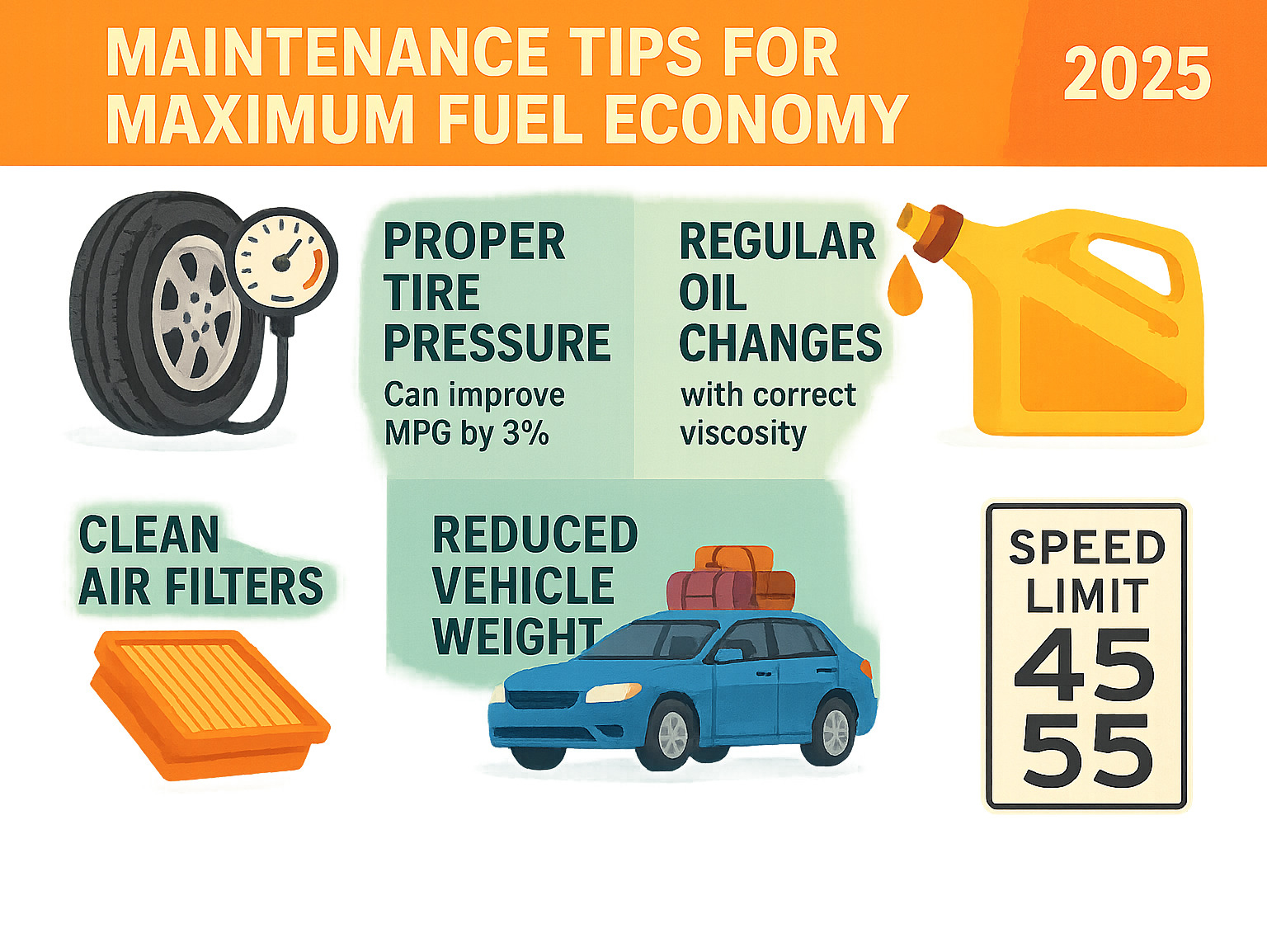
Conclusion: Your Ultimate Guide to Fuel-Efficient Travel
Finding the best highway gas mileage car has never been easier, thanks to the incredible advances in automotive technology we’ve seen in 2025. Whether you’re drawn to the efficiency-leading Toyota Prius with its impressive 56-57 mpg highway rating, or you need the practicality of an SUV like the Kia Niro that delivers 54 mpg highway, there’s a fuel-efficient vehicle perfectly suited to your lifestyle.
The key is matching your car to your actual needs. If you’re a daily highway commuter, the 2025 Hyundai Elantra Hybrid offers outstanding value at 54 mpg highway with a starting price that won’t break the bank. Families who need extra space will find the Kia Niro strikes the perfect balance between efficiency and utility, while luxury seekers can enjoy the refined Lexus UX Hybrid without guilt at 41 mpg highway.
Budget-conscious buyers shouldn’t overlook the used car market. The 2017 Hyundai Ioniq Hybrid remains one of the most efficient vehicles ever made at 59 mpg highway, proving that exceptional fuel economy doesn’t require a brand-new car payment.
What excites us most at Carnews4you.com is how dramatically the automotive landscape has evolved. Modern hybrids have transformed from boring econoboxes into engaging vehicles that deliver both exceptional fuel economy and genuine driving satisfaction. The intersection of automotive innovation and car culture continues producing vehicles that prove efficiency and enjoyment aren’t mutually exclusive.
Even the most efficient car won’t deliver optimal results without your help. Smooth acceleration, steady highway speeds, and regular maintenance can boost any vehicle’s fuel economy by 10-20%. These simple habits turn good fuel economy into great fuel economy.
Technology will keep pushing boundaries, but the fundamentals remain unchanged. Choose a vehicle that fits your driving patterns, maintain it properly, and develop efficient driving habits. Your wallet and the environment will thank you.
The perfect fuel-efficient vehicle for your next trip is out there waiting. Whether it’s a cross-country road trip or your daily commute, the right car can transform every mile into both savings and satisfaction. Find the Best Cars for Road Trips.

